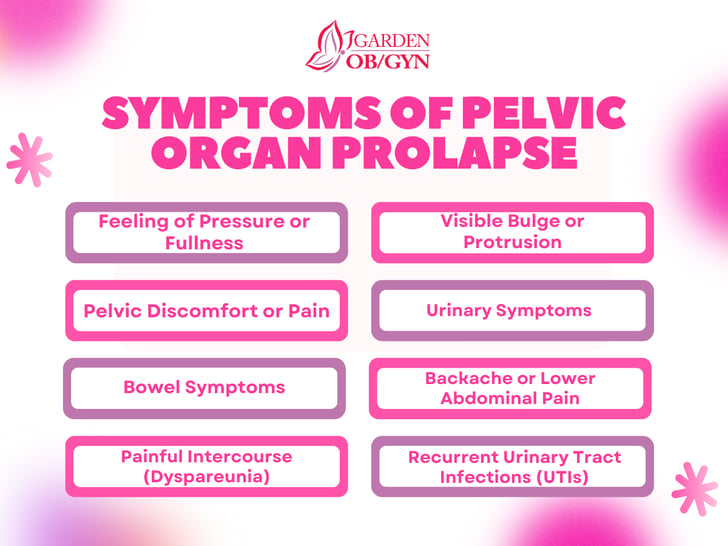Symptoms of Pelvic Organ Prolapse
In this article, we'll delve into the symptoms of pelvic organ prolapse, shedding light on what individuals should be aware of.

Pelvic organ prolapse (POP) is a condition that can significantly impact a person's well-being, often manifesting through various symptoms. Recognizing these signs is crucial for early detection and seeking appropriate medical attention. In this article, we'll delve into the symptoms of pelvic organ prolapse, shedding light on what individuals should be aware of.
-
Feeling of Pressure or Fullness: A prevalent symptom of pelvic organ prolapse is a persistent sensation of pressure or fullness in the pelvic region. This discomfort may vary in intensity but is often described as a consistent feeling of heaviness.
-
Visible Bulge or Protrusion: In more advanced cases of prolapse, individuals may notice a visible bulge or protrusion at the opening of the vagina. This bulge may become more pronounced during activities like standing, straining, or lifting heavy objects.
-
Pelvic Discomfort or Pain: Pelvic discomfort or pain is another common symptom of prolapse. Individuals may experience aching or soreness in the pelvic area, which can be exacerbated by prolonged periods of standing, sitting, or engaging in physical activities.
-
Urinary Symptoms: Pelvic organ prolapse can impact bladder function, leading to urinary symptoms such as incontinence, urgency, or increased frequency of urination. Some individuals may also experience difficulty emptying the bladder completely.
-
Bowel Symptoms: Prolapse may affect the rectum and result in bowel symptoms, including constipation or difficulty with bowel movements. Straining during bowel movements can exacerbate these symptoms.
-
Backache or Lower Abdominal Pain: Chronic backache or lower abdominal pain can be associated with pelvic organ prolapse. The strain on the pelvic floor muscles and surrounding tissues can contribute to persistent discomfort in these areas.
-
Painful Intercourse (Dyspareunia): Some individuals with pelvic organ prolapse may experience pain or discomfort during sexual intercourse. The displacement of pelvic organs can lead to changes in vaginal anatomy, contributing to this symptom.
-
Recurrent Urinary Tract Infections (UTIs): In cases where prolapse affects the urinary system, individuals may be more prone to recurrent urinary tract infections. The incomplete emptying of the bladder can create an environment conducive to bacterial growth.
Being attuned to the symptoms of pelvic organ prolapse is crucial for early intervention and effective management. If you or someone you know is experiencing any of these signs, it's essential to consult with a healthcare professional for a comprehensive evaluation. Timely diagnosis and appropriate treatment can significantly improve the quality of life for individuals affected by pelvic organ prolapse. Remember, proactive awareness and seeking medical advice are key to maintaining pelvic health.
































